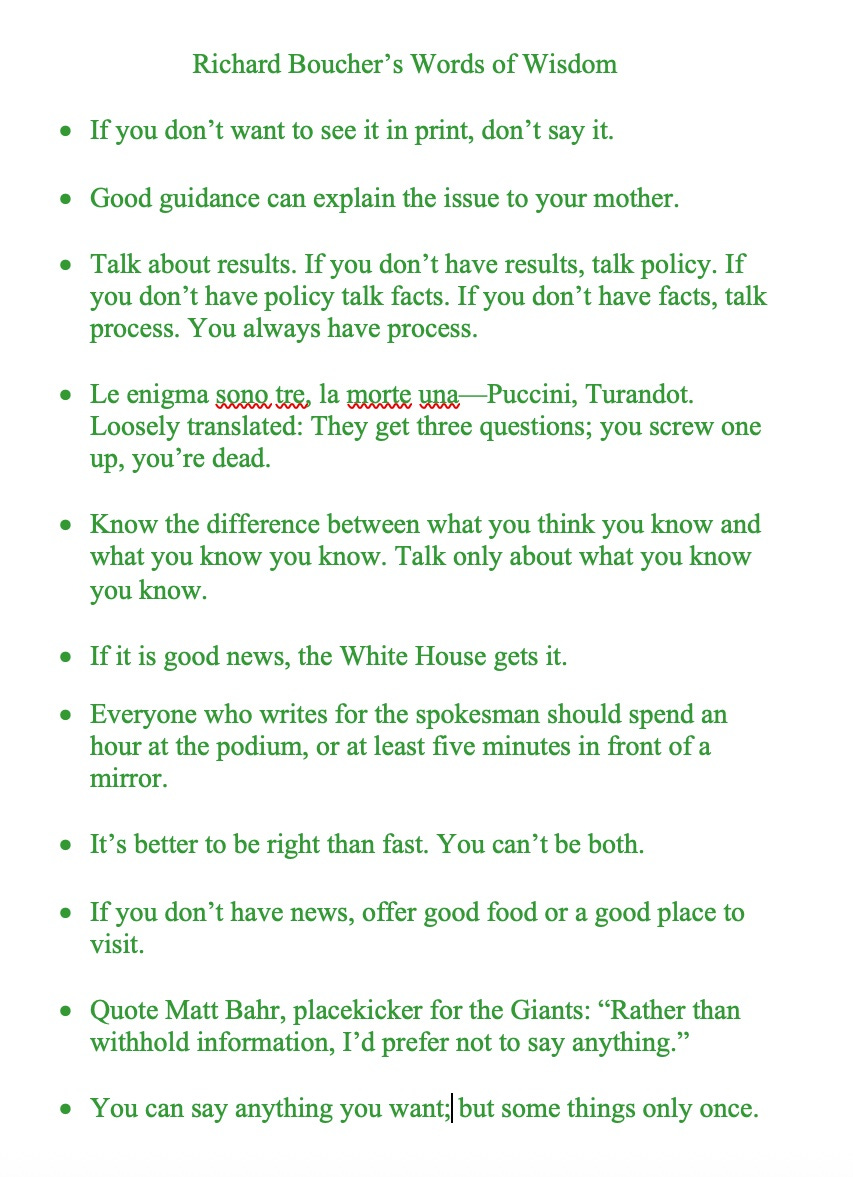If you worked at the State Department at any point over the last three decades, you’ve probably heard of The Boucher Rules.
Legendary diplomat Richard Boucher, who passed away on June 27 after a short bout with an aggressive form of cancer, was the longest-serving Assistant Secretary for Public Affairs in State Department history. In that and other roles at State, Richard mentored thousands of U.S. government officials, helping them become stronger communicators while holding onto their humanity in tough jobs. Richard was known not just for being an exceptionally skilled diplomat and spokesperson, but for being a warm, gracious mensch who also happened to communicate like an actual human being — not exactly a universal trait among government spokespeople.
I didn’t personally know Richard well, but he had an indelible impact on my career. My friend and role model Caitlin Hayden, who worked closely with Richard for years, shared a beautiful remembrance on LinkedIn, one of many that speak to his impact on generations of communicators. And nearly all of them mention the Boucher Rules.
Richard Boucher’s Words of Wisdom, usually referred to as “the Boucher Rules,” is a deceptively simple one-page Word document of hard-won wisdom in telltale green Times New Roman 11 font. It’s been endlessly forwarded by State employees for decades, and taped above the desks of countless diplomats and communicators around the world.
I love these rules so much. Their clarity. Their specificity. Their tactical, practical advice. Their human touch, where Richard’s sense of humor and personality come through. The way they center the audience (I say some permutation of “good guidance can explain the issue to your mother” at least weekly to clients).
And I love how the Boucher rules apply across generational, cultural, and partisan divides. I’ve shared these rules with comms leaders in Silicon Valley, Gen Z undergrads, and mid-career civil servants from Southeast Asia. They work on any platform, from a U.S. government podium to a TikTok video. You can be brand new at communication, or a seasoned pro. They’re truly universal.
Richard’s rules emphasize credibility, integrity, and professionalism. They’re also realistic about the limits and realities of comms work. He knew it wasn’t possible to always have perfect answers (even though it seemed like he did). He knew that good comms couldn’t fix bad policy, and that bad comms could squash good policy.
It’s especially poignant that we lost Richard right as the State Department is cutting swaths of foreign and civil service officers, up to 15% of the entire workforce. These public servants all swore an oath to the Constitution, not a President or a political agenda. Boucher epitomized the ideal of a truly nonpolitical State Department, serving as the chief spokesperson of both Republican and Democratic foreign policy. He knew the State Department better than almost anyone, warts and all. And he inspired generations of public servants who devoted their lives and careers to State - many of whom are potentially losing their jobs as I write this.
Speaking on-the-record, on camera, daily, about complex U.S. foreign policy and national security issues from around the world is arguably one of the trickiest jobs in government. I once heard a different State Department spokesperson refer to that job as “a daily invitation to get fired.” Foreign governments hang on your every word at the briefing and regularly complain about how the State Department spokesperson talked about an issue at the briefing (or sometimes what they didn’t say). I personally think the State Department press corps is the toughest in town: reporters often stay on the beat for years, informing their relentless questions and refusal to be spun.
Richard held that job for over a decade, serving across three very different Presidents and six Secretaries of State. Tellingly, reporters loved working with Richard even as they challenged and argued with him. As former CNN reporter and fellow Substacker
has noted, Richard made a practice of stopping by the press bullpen after every briefing to take off-the-record questions. He looked out for them on international trips, and fought for press access in countries that don’t support media freedom. He helped press distill complex foreign policy issues, was responsive to their queries, and treated reporters with respect even when doing verbal jiu-jitsu from the podium.The Boucher Rules remind us that the media-spokesperson relationship is adversarial by design, but works best when respectful in practice. That your integrity is more important than winning the argument of the day, and how easy it is to compromise your hard-won credibility. And that you don’t have to be a bully to get your point across and be respected.
In a world full of Karolines, be a Richard.



Emily thank you for this post. You may have not known Richard well, but you nailed him. He was the GOAT of spokesmen and a wonderful person who was instrumental in helping me understand and cover the State Department. He will be missed, especially today where the Boucher Rules are a lost art in Washington.
He was the best, and so are you ❤️💙